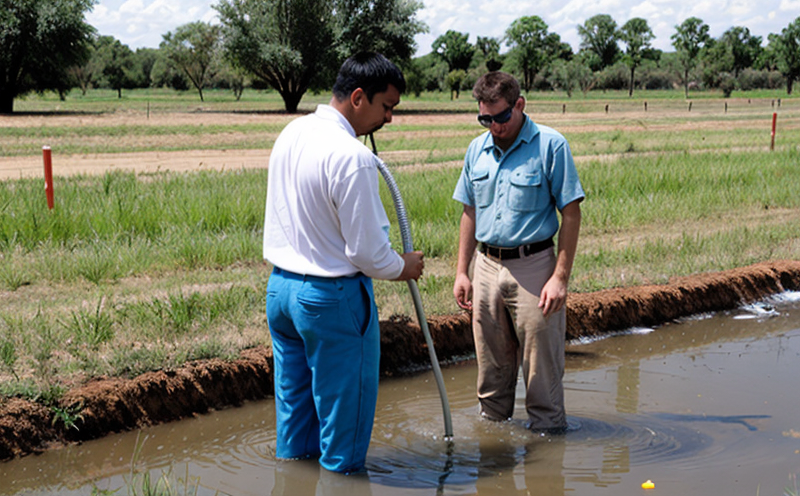APHA 2540D Total Suspended Solids TSS Test in Groundwater
The APHA 2540D Total Suspended Solids (TSS) Test in Groundwater is a critical analytical procedure used to measure the concentration of particles suspended in water samples. This method, detailed in the American Public Health Association’s standard procedure, is essential for ensuring the quality and safety of groundwater resources. The test provides insights into potential pollution sources and helps environmental scientists and engineers assess water quality.
The total suspended solids are defined as those particulate matter that remain after a water sample has been filtered through a Whatman GF/F filter. The APHA 2540D method involves filtering the sample onto this filter, drying it to constant weight at 103 ± 2°C, and then weighing the dried filter to determine the mass of suspended solids.
This test is particularly important in the context of groundwater monitoring. Groundwater plays a vital role in sustaining ecosystems, supporting agriculture, and providing drinking water for communities worldwide. Contamination from industrial activities, agricultural runoff, or natural sources can increase TSS levels, posing risks to both aquatic life and human health. By regularly measuring TSS using this method, environmental professionals can monitor changes over time and identify potential threats early.
The APHA 2540D test is part of a broader suite of analytical methods used in groundwater quality assessment. Other relevant tests include those for dissolved oxygen (DO), pH, nitrates, and heavy metals. Together, these analyses provide a comprehensive picture of the water's health and potential risks.
The results from this method are typically expressed as milligrams per liter (mg/L). Compliance with regulatory standards is essential; many regions have established limits for TSS in groundwater to protect public health and the environment. For instance, the U.S. Environmental Protection Agency (EPA) sets maximum contaminant levels for various pollutants, including suspended solids.
In addition to its role in compliance monitoring, the APHA 2540D test is also valuable for research purposes. Scientists can use this method to study how TSS levels vary seasonally or after specific events such as heavy rainfall or agricultural activities. This information is crucial for developing effective mitigation strategies and understanding the natural processes that affect water quality.
The accuracy of the APHA 2540D test depends on several factors, including proper sample handling, filter selection, drying conditions, and weighing precision. Quality managers in laboratories must ensure strict adherence to protocol to achieve reliable results. Compliance officers can use these data points to monitor compliance with environmental regulations.
R&D engineers can leverage the insights gained from this method to develop new technologies for water purification or to enhance existing systems. For procurement professionals, understanding the importance of this test helps them select reputable suppliers and ensure that the necessary equipment is available for testing.
Applied Standards
The APHA 2540D method adheres strictly to international standards such as ISO 787:1998 and ASTM D6382-10. Compliance with these standards ensures consistency in analytical methods across different laboratories, which is crucial for accurate data interpretation.
The method also aligns with other relevant international protocols such as the European standard EN 12597:2014, which provides guidance on water quality assessment. By following these standards, environmental professionals can ensure that their testing procedures are up-to-date and compliant with global best practices.
The APHA 2540D test is widely recognized for its reliability and precision in measuring total suspended solids. It has been validated through numerous studies and is recommended by regulatory bodies worldwide as a standard method for TSS determination in water samples. This recognition underscores the importance of this method in environmental testing.
Industry Applications
The APHA 2540D Total Suspended Solids (TSS) Test is widely applied across various sectors, particularly in industries that interact with groundwater resources directly or indirectly. Here are some key industry applications:
- Agriculture: Monitoring TSS can help identify nutrient runoff from farms, which contributes to eutrophication and water pollution.
- Manufacturing: Industries releasing wastewater into groundwater can use this test to ensure compliance with discharge limits set by regulatory bodies like the EPA or OSHA.
- Water Utilities: Water treatment plants rely on TSS testing to maintain optimal conditions for filtration and prevent contamination of treated water supplies.
- Oil & Gas: In exploration and production, TSS tests are crucial for evaluating the impact of drilling operations on nearby aquifers.
In each of these industries, accurate and consistent TSS measurements provide critical data for decision-making processes. Quality managers can use this information to ensure that their organizations meet regulatory requirements and contribute positively to environmental sustainability efforts.
Environmental and Sustainability Contributions
- Ecosystem Health: By monitoring TSS levels, we can track the health of aquatic ecosystems. High levels of suspended solids can lead to oxygen depletion in water bodies, harming fish and other organisms that rely on stable oxygen levels.
- Agricultural Impact: Reducing agricultural runoff through better management practices can lower TSS in groundwater, improving soil quality and reducing pollution downstream.
- Climate Change Mitigation: By preventing pollutants from entering groundwater, we help mitigate climate change by preserving natural water cycles.
- Sustainable Development Goals: Compliance with the APHA 2540D test contributes to achieving several United Nations Sustainable Development Goals, including clean water and sanitation (SDG6), responsible consumption and production (SDG12), and sustainable cities and communities (SDG11).
The APHA 2540D Total Suspended Solids Test is a cornerstone of environmental monitoring efforts. By providing reliable data, this method enables industries to make informed decisions that protect groundwater resources and support broader sustainability goals.





